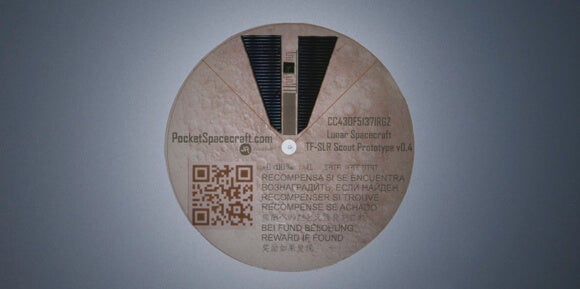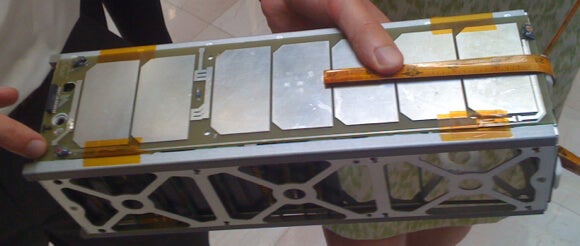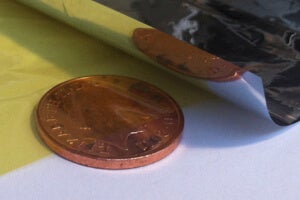Kickstarter Project to Send Thousands of Personal Spacecraft to the Moon
NASA's twin Voyager spacecraft famously carry a pair of golden records encoded with images and sounds from Earth. Now, a new project hopes to similarly send discs to space. Only these discs are slightly more advanced. In fact, they’re spacecraft in their own right; thousands will fit into a CubeSat; and each one carries "computing power comparable to that of the Voyager spacecraft and Apollo flight computers."

Share
Fifty years ago, kids participated in the space race by launching homemade rockets a few hundred feet in the air. With the Pocket Spacecraft Kickstarter, space fans may send their very own personal spacecraft to the Moon for as little as £199 (about $300) or £39 (about $60) to share their voyage with 20 other lunar-tics.
The spacecraft (or Scouts) are tiny polyimide discs—three inches across, weighing about a gram, and as thin as a piece of paper—but they’ll carry solar cells for power, a miniature computer, sensor suite, and radio antenna printed on or affixed to the surface.
In fact, each Scout boasts "computing power comparable to that of the Voyager spacecraft and Apollo flight computers."
Participants will be able to track the progress of their spacecraft on a mission control smartphone app—including an augmented reality function whereby the user points their device at the sky to find their Scout.
Beyond going to the Moon, Pocket Spacecraft hopes their Scouts are able to survive reentry and land on a planet with an atmosphere like the Earth (or Mars, or Venus, or wherever!). Though the Scouts' capability pales in comparison to the likes of one of NASA's Mars rovers, they could potentially record basic data like magnetic field, temperature, or pressure and send these observations back home.
If funded, Kickstarters will design and test their custom spacecraft over 18 months. The finished Scouts will be loaded into a 3U CubeSat mothership and sent into Earth orbit on a commercial rocket.
Be Part of the Future
Sign up to receive top stories about groundbreaking technologies and visionary thinkers from SingularityHub.


From orbit, phase one of the mission will send a batch of Scouts back to Earth to prove them resistant to the rigors of reentry. (And to inspire a treasure hunt to find the fallen Scouts.) The mothership will then deploy a solar sail or fire up a solar-powered electrolysis propulsion system to slingshot it around the Earth to the Moon. From lunar orbit, the ship will send the remaining Scouts to the Moon’s surface.
We recently wrote about how CubeSats are democratizing space at a furious pace. Now, there's a push to move CubeSats beyond Earth orbit. If successful, the Pocket Spacecraft Kickstarter could be a pathfinder for interplanetary CubeSats and one of the first crowdfunded small satellites to go to another celestial body.
It's an ambitious project, to be sure, but the project's goals are plausible. CubeSat technology is maturing fast and continues to be tested in Earth orbit. And the team behind Pocket Spacecraft is experienced. Several team members worked on the early CubeSat Kickstarter, Kicksat, to be launched by NASA later this year. So, why not test the boundaries and see how far crowdfunded space projects can go?
The 22 teams competing for the $30 million Google Lunar XPRIZE (set to expire at the end of 2015) may get to the Moon first. But thousands more privately funded Scouts could invade shortly thereafter (August 2016, by the project’s ETA).
In either case, it’s remarkable that some of the first manmade objects to land on the Moon's surface since the 70s may be built and deployed by privately funded (or crowdfunded) collaborations of enthusiastic hackers and space nerds.
Image Credit: pocketspacecraft.com, Pocket Spacecraft Kickstarter
Jason is editorial director at SingularityHub. He researched and wrote about finance and economics before moving on to science and technology. He's curious about pretty much everything, but especially loves learning about and sharing big ideas and advances in artificial intelligence, computing, robotics, biotech, neuroscience, and space.
Related Articles

Scientists Say We Need a Circular Space Economy to Avoid Trashing Orbit

New Images Reveal the Milky Way’s Stunning Galactic Plane in More Detail Than Ever Before

Future Data Centers Could Orbit Earth, Powered by the Sun and Cooled by the Vacuum of Space
What we’re reading



